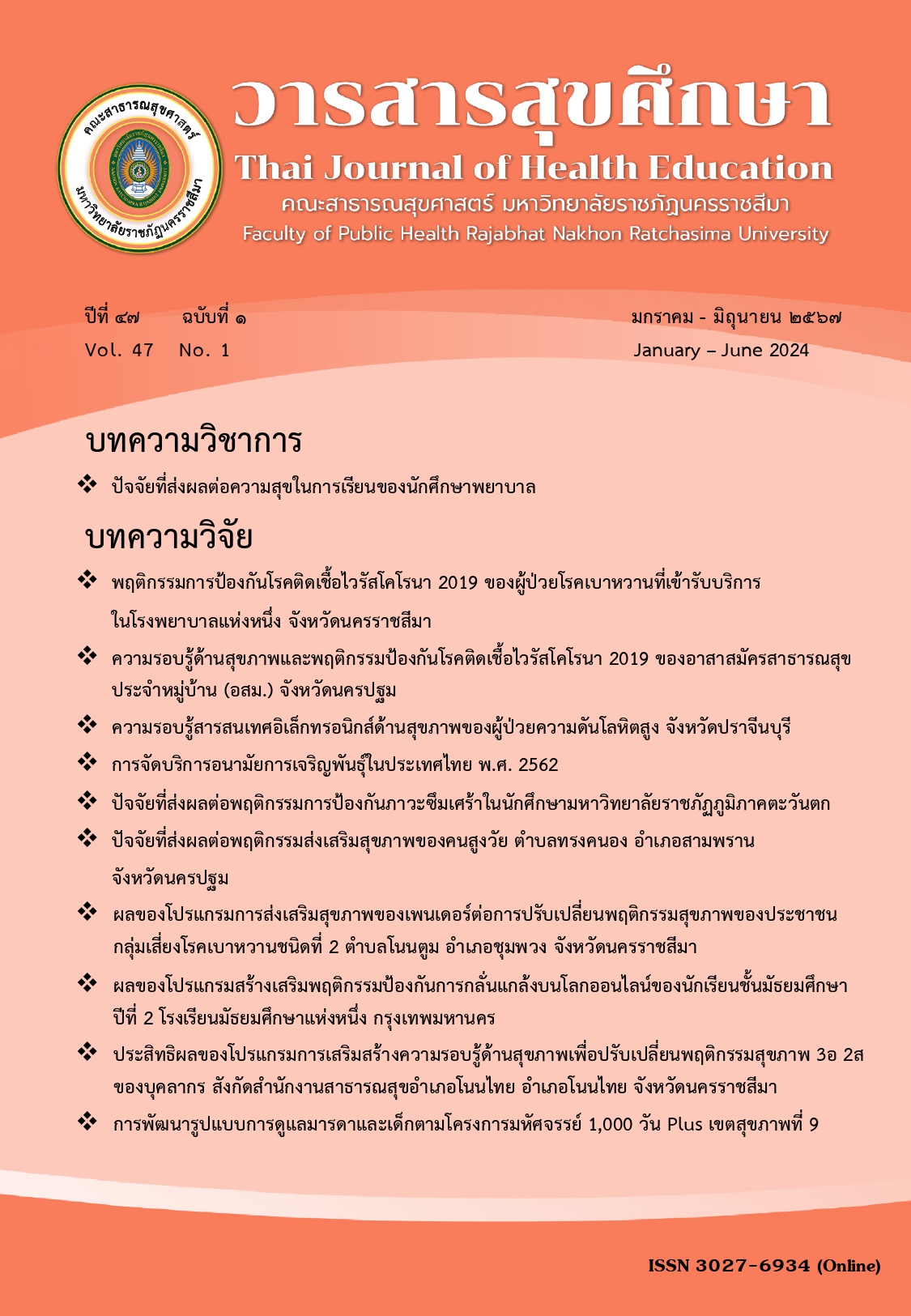The Effects of the Promotion Program in Cyberbullying Prevention Behavior in Eighth Grade Students of a Secondary School in Bangkok Metropolis
Keywords:
Cyberbullying, Adolescents, Self-efficacy theoryAbstract
The cyberbullying problem among adolescents is increasing. Promoting the acquisition of cyberbullying prevention skills among adolescents is therefore necessary and important. This quasi-experimental research aimed to study the effectiveness of a promotion program incyberbullying prevention behaviors in eighth grade students of a secondary school in Bangkok.The study sample comprised 65 eighth-grade students, divided into an experimental group of 30 students and a comparison group of 35 students. The experimental group participated in a program developed based on self-efficacy and social support theories. The program consists of 4 learning activities and the activities were organized once a week. Methods for organizing learning activities include lectures, group counseling to share experiences, role-playing, live modeling, and anonymous discussions in line groups. Data were collected using a self-assessment questionnaire and analyzed using descriptive statistics, such as frequency, percentage, mean, and standard deviation. Research hypotheses were analyzed with the chi-squared test, independent samples t-test, and paired samples t-test, with a significance level set at 0.05.
After experimentation, the experimental group had significantly higher scores on self-efficacy in preventing cyberbullying. They also exhibited increased outcome expectations regarding the benefits of cyberbullying prevention, and cyberbullying prevention behaviors compared to before the experiment and significantly more than the comparison group (p<0.05), with p-values equal to 0.003, 0.001, and 0.001 respectively. It can be concluded that the program effectively promoted cyberbullying prevention behavior and increased perceived self-efficacy within the experimental group.
References
Amnesty International Thailand. Cyberbullying การกลั่นแกล้งบนโลกออนไลน์ที่คุ้นเคยแต่ไม่ควรคุ้นชิน [อินเทอร์เน็ต]. Amnesty International Thailand; 2564 [สืบค้นเมื่อวันที่ 17 ต.ค. 2565]. จาก: https://www.amnesty.or.th/latest/blog/879/.
สำนักงานกองทุนสนับสนุนการสร้างเสริมสุขภาพ. การกลั่นแกล้งบนโลกไซเบอร์ [Cyberbullying]. ปทุมธานี: มูลนิธิส่งเสริมสื่อเด็กและเยาวชน (สสย.); 2563.
Craig W, Fisch YH, Grinvald HF, Dostaler S, Hetland J, Morton BS, et al. A cross-national profile of bullying and victimization among adolescents in 40 countries. Int J Public Health. 2009;54(Suppl.2):S2:216-224. doi:10.1007/s00038-009-5413-9.
Ipsos. Global Views on Cyberbullying. [Internet]. 2018. [cited 2022 Oct 17]. Available from: https://www.ipsos.com/en-th/global-views-cyberbullying.
นัฐิยา พัวพงศกร. AIS ชวนคนรุ่นใหม่เล่าประสบการณ์ ‘บูลลี่’ เผยข้อมูลเด็กไทยเสี่ยงถูกกลั่นแกล้ง ออนไลน์สูงกว่าค่าเฉลี่ยโลก นักจิตวิทยาย้ำจัดการอารมณ์ตัวเองคือทางออก [อินเทอร์เน็ต]. ThaiPublica; 2563 [สืบค้นเมื่อวันที่ 17 ต.ค. 2565]. จาก: https://thaipublica.org/2020/06/ais-cyberbullying-20-6-2563/.
ธีรยุทธ แก้วสิงห์. ติดอันดับต้นของเอเชีย! เด็กไทยกว่า 80% เคยเจอ ‘การบูลลี่’ เกือบครึ่งมองเป็นเรื่องปกติ [อินเทอร์เน็ต]. สำนักข่าวอิศรา; 2564. [สืบค้นเมื่อวันที่ 17 ต.ค. 2565]. จาก: https://www.isranews.org/article/isranews-article/105059-isranews-bullying.html.
ปองกมล สุรัตน์. สาเหตุและผลกระทบที่เกี่ยวข้องกับการรังแกผ่านโลกไซเบอร์. [วิทยานิพนธ์ปริญญาดุษฎีบัณฑิต]. มหาวิทยาลัยศรีนครินทรวิโรฒ. 2561.
Bandura A. Social Learning Theory. Englewood Cliffs, NJ: Prentice Hall; 1977.
Bandura A. Self-efficacy: The Exercise of Control. New York: Freeman; 1997.
Norbeck JS. The use of social support in clinical practice. J Psychosoc Nurs Ment Health Serv. 1982;20(12):22-29. doi:10.3928/0279-3695-19821201-05.
Cohen J. Statistical Power Analysis for the Behavioral Sciences. 2nd ed. Hillsdale, NJ: Lawrence Erlbaum Associates, Publishers; 1988.
Bloom BS, Madaus GF, Hastings JT. Handbook on Formative and Summative Evaluation of Student Learning. New York: McGraw-Hill Book Company; 1971.
Furr, M. Summary of Effect Size and their Links to Inferential Statistics. [Internet]. 2008. [cited 2024 March 25]. Available from: https://furrrm.sites.wfu.edu/wp-content/uploads/2018/09/EffectSizeFormulas.pdf.
ดวงกมล ทองอยู่. แนวทางการพัฒนาการเห็นคุณค่าในตนเองของวัยรุ่นตามทฤษฎีการรับรู้ความสามารถของตน. [วิทยานิพนธ์ ปริญญาดุษฎีบัณฑิต]. มหาวิทยาลัยราชภัฏวไลยอลงกรณ์ในพระบรมราชูปถัมภ์. 2557.
ศรสลัก นิ่มบุตร และ ฐาศุกร์ จันประเสริฐ. ประสิทธิผลของโปรแกรมส่งเสริมการรับรู้ความสามารถของตนเองต่อพฤติกรรมการ ตั้งเป้าหมายทางการเรียนของนักเรียนมัธยมศึกษาปีที่ 2 โรงเรียนสาธิตแห่งหนึ่ง. [วิทยานิพนธ์ปริญญาดุษฎีบัณฑิต]. มหาวิทยาลัยศรีนครินทรวิโรฒ. 2563.
Downloads
Published
Issue
Section
License
Copyright (c) 2024 Thai Journal of Health Education

This work is licensed under a Creative Commons Attribution-NonCommercial-NoDerivatives 4.0 International License.



